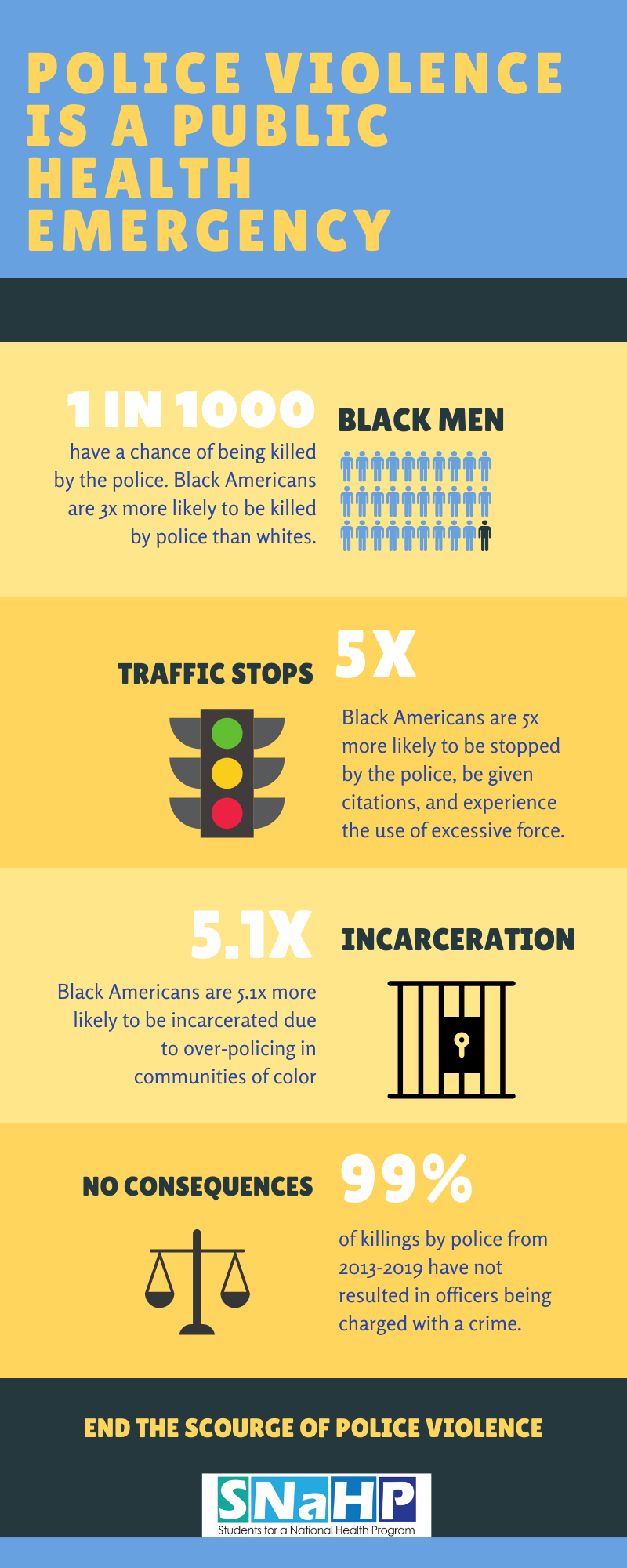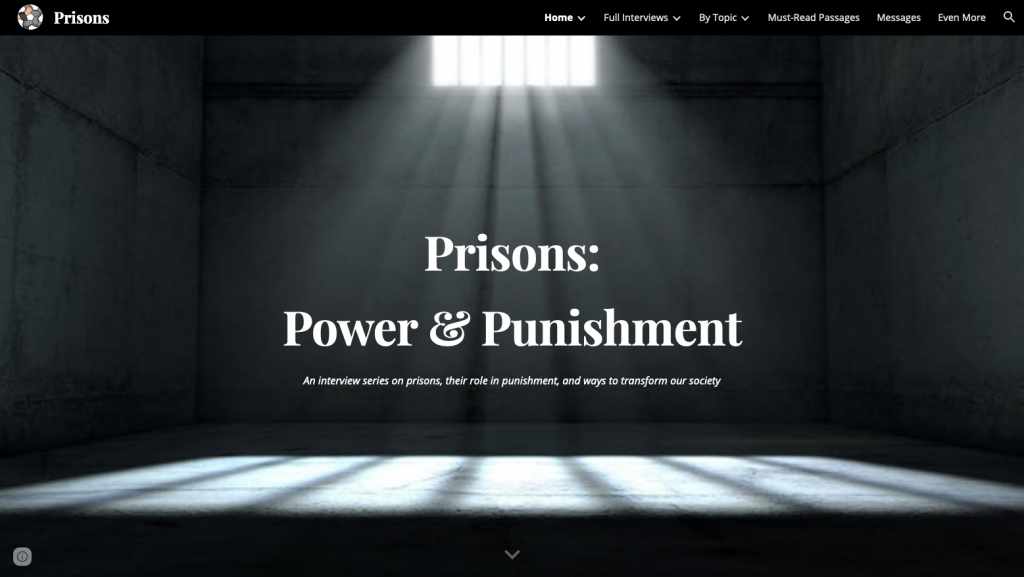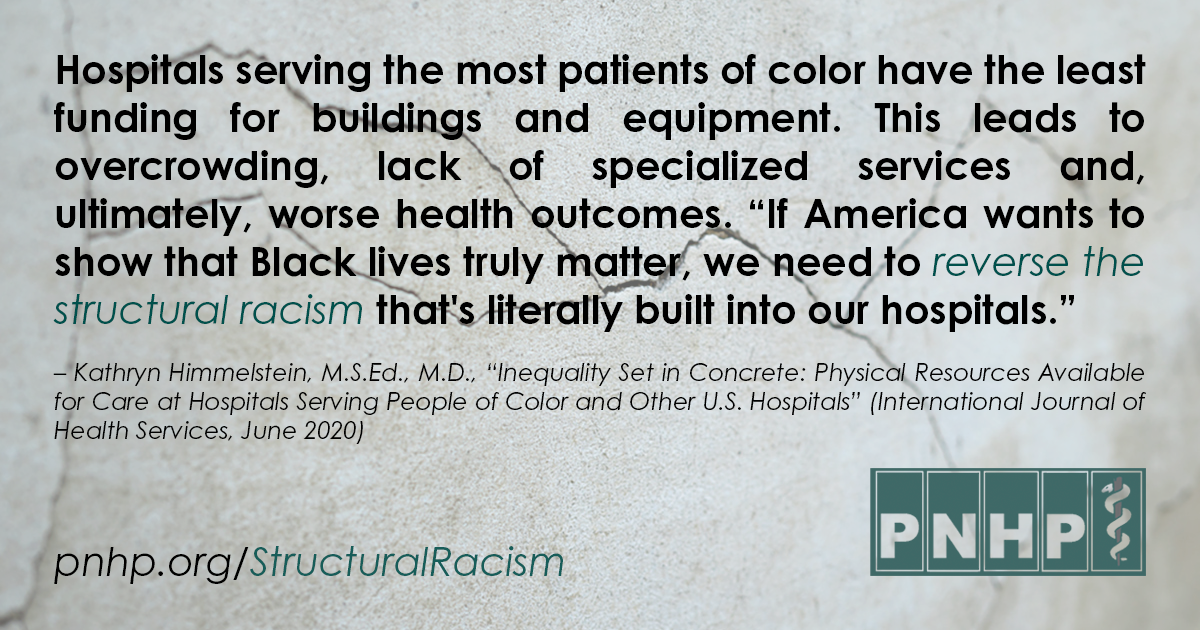Physicians for a National Health Program issued the following statement on June 2, 2020 in response to the continued and unrelenting violence, racism, and discrimination that Black Americans are subjected to in our criminal justice system, our health care system, and throughout society.
Our full statement can also be accessed as a printable PDF, here, with all reference links intact. We encourage PNHP members to read the statement in full, distribute it widely, and take concrete steps to address racism and racial inequity.
Protesting racism across the U.S.
Doctors, nurses, and other medical professionals (including many PNHP members) have participated in protests nationwide in the weeks following the murder of George Floyd. NYC Coalition to Dismantle Racism in the Health System co-founder Dr. Kamini Doobay spoke at one such rally on June 7, 2020.
(Footage of Dr. Doobay and additional footage from an earlier NYC rally courtesy of PNHP New York Metro board member Dr. Steve Auerbach.)
Police violence at anti-racism protests
Sadly, police departments across the U.S. have reacted to non-violent protests with abusive tactics that endanger the large crowds of people gathered to demand justice.
PNHP president Dr. Adam Gaffney, PNHP co-founders Drs. Steffie Woolhandler and David Himmelstein, and Dr. Danny McCormick decried the use of chemical irritants and kinetic impact projectiles, the corralling of crowds into confined areas, and the mass arrest of protesters, often for curfew violations. They published a June 19, 2020 piece in The Lancet calling for an end to these human rights abuses.
Student activism on racial inequity
PNHP’s student arm, Students for a National Health Program, posted the following graphic to social media on June 9, 2020, and its executive board has committed to developing a long-term strategy for supporting the anti-racism movement.
Also during the summer of 2020, PNHP intern Andrea Yeung created an important website focusing on prisons in the United States, which have served to accelerate many racial injustices (and which have posed a significant health risk to inmates and staff during COVID-19).
Andrea’s website includes full transcripts of seven interviews with individuals whose work and experience with incarcerated people can lead us towards a more just society, along with key takeaways and pages organized by topic.
Medical students have also been organizing for years with White Coats for Black Lives, whose mission is, “Eliminating racism in the practice of medicine and recognizing racism as a threat to the health and well-being of people of color.”
For more information, visit the White Coats for Black Lives website, follow their Facebook, Twitter, and Instagram accounts, and view an Ethics Talk interview with WC4BL leaders, Drs. Joniqua Ceasar and Dorothy Charles.
Racial inequities in U.S. health care
For additional context on how racism affects health and health care, see PNHP president-elect Dr. Susan Rogers’ keynote address to medical and health professional students at the 9th annual SNaHP Summit in Aurora, Colo. (February 15, 2020).
See also a panel discussion moderated by Dr. Rogers for DSA’s Black Health + Black Liberation webinar series: “Why do we have racial health inequities?” Panelists included PNHP national coordinator Dr. Claudia Fegan, former APHA president Dr. Linda Rae Murray, and former NYC Department of Health and Mental Hygiene commissioner Dr. Mary Bassett (September 14, 2020).
And note that recent research points to literal structural racism in U.S. health care. A June 2020 International Journal of Health Services study from Gracie Himmelstein and Dr. Kathryn EW Himmelstein, titled “Inequality Set in Concrete,” shows that hospitals serving the largest proportion of Black and Latinx patients have significantly lower capital assets and much smaller budgets for modernization and new equipment compared to other U.S. hospitals.
For a broader toolkit on racial health inequities, please see PNHP’s Kitchen Table Campaign from February 2020 at pnhp.org/RacialJustice. Members will find information on lack of coverage, lack of community health facilities, and significantly worse outcomes among people of color in the U.S., as well as information on how single-payer Medicare for All could begin to address these inequities.
PNHP also recognizes that the COVID-19 pandemic is especially dangerous for people of color in the U.S. due to systemic racism. We have therefore developed a toolkit for members to explore and address the ways in which COVID exacerbates racial inequities, which is available at pnhp.org/COVIDRacialInequity.



